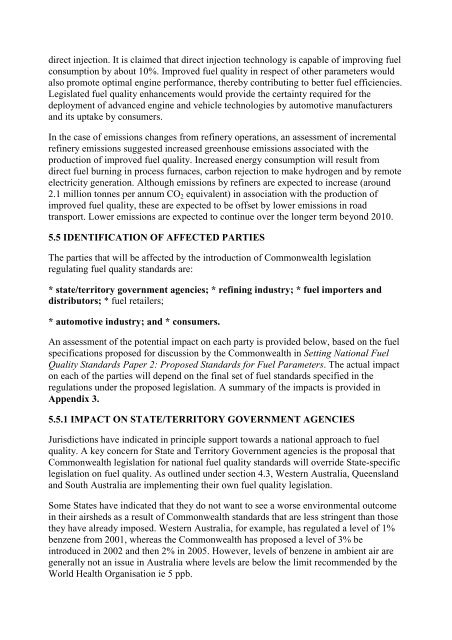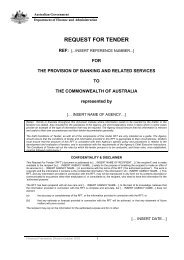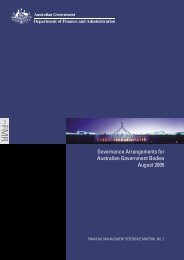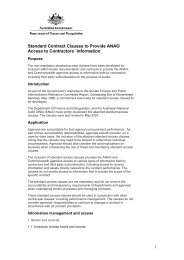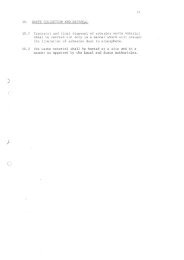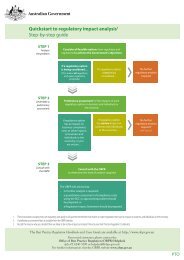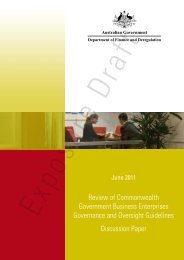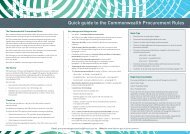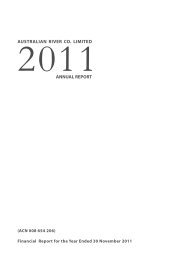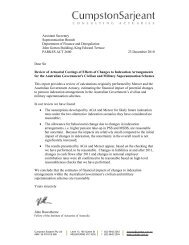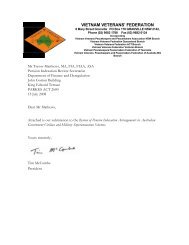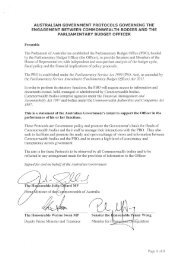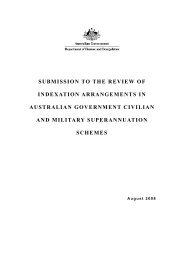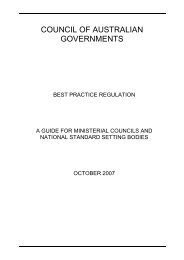National Fuel Quality Standards Regulation Impact Statement 1 ...
National Fuel Quality Standards Regulation Impact Statement 1 ...
National Fuel Quality Standards Regulation Impact Statement 1 ...
Create successful ePaper yourself
Turn your PDF publications into a flip-book with our unique Google optimized e-Paper software.
direct injection. It is claimed that direct injection technology is capable of improving fuel<br />
consumption by about 10%. Improved fuel quality in respect of other parameters would<br />
also promote optimal engine performance, thereby contributing to better fuel efficiencies.<br />
Legislated fuel quality enhancements would provide the certainty required for the<br />
deployment of advanced engine and vehicle technologies by automotive manufacturers<br />
and its uptake by consumers.<br />
In the case of emissions changes from refinery operations, an assessment of incremental<br />
refinery emissions suggested increased greenhouse emissions associated with the<br />
production of improved fuel quality. Increased energy consumption will result from<br />
direct fuel burning in process furnaces, carbon rejection to make hydrogen and by remote<br />
electricity generation. Although emissions by refiners are expected to increase (around<br />
2.1 million tonnes per annum CO2 equivalent) in association with the production of<br />
improved fuel quality, these are expected to be offset by lower emissions in road<br />
transport. Lower emissions are expected to continue over the longer term beyond 2010.<br />
5.5 IDENTIFICATION OF AFFECTED PARTIES<br />
The parties that will be affected by the introduction of Commonwealth legislation<br />
regulating fuel quality standards are:<br />
* state/territory government agencies; * refining industry; * fuel importers and<br />
distributors; * fuel retailers;<br />
* automotive industry; and * consumers.<br />
An assessment of the potential impact on each party is provided below, based on the fuel<br />
specifications proposed for discussion by the Commonwealth in Setting <strong>National</strong> <strong>Fuel</strong><br />
<strong>Quality</strong> <strong>Standards</strong> Paper 2: Proposed <strong>Standards</strong> for <strong>Fuel</strong> Parameters. The actual impact<br />
on each of the parties will depend on the final set of fuel standards specified in the<br />
regulations under the proposed legislation. A summary of the impacts is provided in<br />
Appendix 3.<br />
5.5.1 IMPACT ON STATE/TERRITORY GOVERNMENT AGENCIES<br />
Jurisdictions have indicated in principle support towards a national approach to fuel<br />
quality. A key concern for State and Territory Government agencies is the proposal that<br />
Commonwealth legislation for national fuel quality standards will override State-specific<br />
legislation on fuel quality. As outlined under section 4.3, Western Australia, Queensland<br />
and South Australia are implementing their own fuel quality legislation.<br />
Some States have indicated that they do not want to see a worse environmental outcome<br />
in their airsheds as a result of Commonwealth standards that are less stringent than those<br />
they have already imposed. Western Australia, for example, has regulated a level of 1%<br />
benzene from 2001, whereas the Commonwealth has proposed a level of 3% be<br />
introduced in 2002 and then 2% in 2005. However, levels of benzene in ambient air are<br />
generally not an issue in Australia where levels are below the limit recommended by the<br />
World Health Organisation ie 5 ppb.


